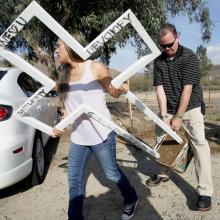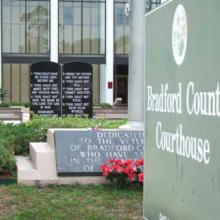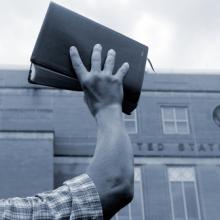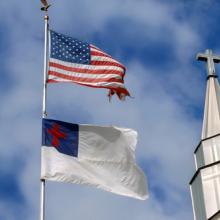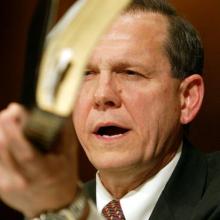separation of church and state
The U.S. Supreme Court on Monday let stand a lower court ruling that a Wisconsin high school acted unconstitutionally when it held its graduation ceremonies in a local megachurch.
As is their custom, the justices did not give a reason for declining to hear a challenge to the 7th Circuit ruling.
Monday’s decision may be a signal by the court that despite its approval of sectarian prayers at public meetings in the Town of Greece v. Galloway decision in May, it draws the line at exposing children to religious symbols when they have not choice about it.
An interfaith coalition has again asked the U.S. House of Representatives to reject a prayer plaque at the World War II Memorial in Washington, D.C.
The proposed plaque, which is under the consideration of a House subcommittee, would feature a prayer spoken by President Franklin Delano Roosevelt on the radio on D-Day, June 6, 1944.
“O Lord, give us Faith,” it reads in part. “Give us Faith in Thee; Faith in our sons; Faith in each other; Faith in our united crusade.” It concludes with, “Thy will be done, Almighty God.”
The coalition — a mix of religious and secular organizations that includes the Center for Inquiry, a humanist organization; three Jewish groups; the Hindu American Foundation; and the United Methodist Church – said the prayer does not reflect the religious diversity of the United States.
A California resort town, already reeling from a legal fight over the placement of memorial crosses at a minor league baseball stadium, is now engaged in another round of bitter acrimony over the display of crosses on public land.
Not long after, another family appeared at the scene to erect six smaller wooden crosses at the same site. Each bore a handwritten message, including “What if this was your child?”, “To each his own,” and “Get a life.”
In November of 1963, C. S. “Jack” Lewis knew he was dying. The Irish-born literary scholar, children’s author, and Christian apologist had come out of a coma in July, only to be diagnosed with end-stage renal failure. He retired from his post at Cambridge University, choosing to die at home in the Kilns, where he lived with his brother, Major Warren (“Warnie”) Lewis.
On Friday, Nov. 22, he retired to his bedroom after lunch. At 4:30 p.m. GMT he took some tea. An hour and a half later, Warnie heard a crash and discovered Jack unconscious. Within three or four minutes, he was dead, exactly one week shy of his 65th birthday.
A few minutes later (11:39 a.m. CST), Air Force One touched down at Love Field in Dallas, Texas, as a motorcade prepared to take President John F. Kennedy and his wife Jacqueline, along with their entourage, to the Dallas Business and Trade Mart. But the motorcade never arrived at its destination.
After the president suffered mortal gunshot wounds to the head at 12:30 p.m., his limousine rerouted to Parkland Memorial Hospital where the 46-year-old president was dead upon arrival.
An organization of nonbelievers is threatening legal action against public schools that participate in an evangelical Christian charity that delivers Christmas toys to poor children.
The American Humanist Association, a national advocacy organization with 20,000 members nationwide, sent letters this week to two public elementary schools after parents complained their children were being asked to collect toys and money for Operation Christmas Child.
Operation Christmas Child is a project of Samaritan’s Purse, an evangelical relief organization founded by Franklin Graham, son of evangelist Billy Graham. Its stated mission is “to follow the example of Christ by helping those in need and proclaiming the hope of the Gospel.”
The toys collected by Operation Christmas Child come with an invitation for recipients to accept Christianity. Since its founding in 1993, Operation Christmas Child has sent 100 million boxes of toys to poor children.
A commission of religious leaders has called for clarity in churches’ ability to endorse candidates and issues from the pulpit without fear of losing their tax-exempt status.
In a report sent Wednesday to Sen. Charles Grassley, an Iowa Republican who has spent years investigating the finances of high-profile televangelists, the commission called the regulation of speech of religious organizations “disturbing and chilling.”
“The IRS guidelines are very vague, so ministers and nonprofit leaders are afraid of the [appropriate] line,” said Michael Batts, the independent commission’s chairman. “We think it can be fixed without creating a monster of unintended consequences.”
The Commission on Accountability and Policy for Religious Organizations grew out of Grassley’s probe of ministry finances and makes recommendations for greater transparency and reform. It is overseen by the Evangelical Council for Financial Accountability, which was founded in 1979 as a watchdog on ethical and financial wrongdoing.
In Wednesday’s report, the commission recommended that members of the clergy should be able to say “whatever they believe is appropriate” from the pulpit without fear of IRS reprisal. Since 1954, IRS regulations allow clergy to speak out on issues but they must refrain from endorsing specific candidates.
The Puritans sailed to these shores 400 years ago seeking freedom of religion, but freedom of their religion only. Earlier this year, a group of North Carolina lawmakers, apparently channeling the Puritans, tried to establish Christianity as the state religion.
Their action was prompted by a complaint filed by the American Civil Liberties Union. The ACLU noted that some county commissions and other governmental boards around the state opened meetings with prayer. While these various boards had policies that allowed for a multiplicity of religious voices, most prayers were offered in the name of Jesus Christ.
Eleven legislators, all white male Christians, backed a bill to codify Christianity in state law, saying the First Amendment to the U.S. Constitution does not trump the state’s rights. The effort died a quick and merciful death.
These misguided politicians forgot a simple truth – even if a state could mandate a public religion, that wouldn’t change what is in people’s hearts. As Roger Williams wrote in June 1670, “Forced worship stinks in God’s nostrils.” Williams, who was expelled by the Puritans and founded a religious colony in Rhode Island, knew firsthand the importance of religious freedom.
After years of fights over religious monuments on public land, a county courthouse in Northern Florida will soon be the home of the nation’s first monument to atheism on public property.
On June 29, the group American Atheists will unveil a 1,500-pound granite bench engraved with secular-themed quotations from Thomas Jefferson, Benjamin Franklin, and its founder, Madalyn Murray O’Hair, among others, in front of the Bradford County Courthouse in Starke, Fla.
The New-Jersey-based group, which has a membership of about 4,000 atheists, humanists, and other non-believers, won the right to erect the monument in a settlement reached in March over a six-ton granite display of the Ten Commandments on the same property.
The Supreme Court agreed Monday to consider whether prayers can be offered at government meetings — a practice that’s been common in Congress and throughout the states for more than two centuries.
The religious expression case, which comes to the court from the town of Greece, N.Y., focuses on the first 10 words of the First Amendment, ratified in 1791: “Congress shall make no law respecting an establishment of religion.”
That Establishment Clause was violated, the 2nd U.S. Circuit Court of Appeals ruled last year, when the Greece Town Board repeatedly used Christian clergy to conduct prayers at the start of its public meetings. The decision created a rift with other appeals courts that have upheld prayer at public meetings, prompting the justices to step in.
A First Amendment watchdog group is suing the Internal Revenue Service for failing to challenge the tax-exempt status of churches whose pastors engage in partisan politicking from the pulpit.
The Freedom From Religion Foundation, which advocates total separation of church and state, filed the lawsuit Wednesday in U.S. District Court in Western Wisconsin, where the 19,000-member organization is based.
The lawsuit claims that as many as 1,500 pastors engaged in “Pulpit Freedom Sunday” on Sunday, Oct. 7, when pastors endorsed one or more candidates, which is a violation of IRS rules for non-profit organizations.
IRS rules state that organizations classified as 501(c)(3) non-profits — a tax-exempt status most churches and other religious institutions claim — cannot participate or intervene in “any political campaign on behalf of (or in opposition to) any political candidate.”
People of faith have long wrestled with the place of faith in the public square. At times religious groups have sought to dominate or control the public square. At other times, they have allowed the state/nation to dominate and control the faith community. Others have sought to distance themselves from the public square – with the Amish being the most distinct example of this. There was a time, a half century ago or more, that mainline Protestantism played a significant role in the public square while evangelicals largely stepped away. In the past three decades the roles have reversed.
The question that is being raised at this time in a number of sectors has to do with whether faith should engage the public square and if so, how should this engagement occur. I have found Mark Toulouse's book God in Public: Four Ways American Christian and Public Life Relate (WJK Press, 2006), to be very helpful in this matter. Mark has a good sense of the relationship between religion and the public square.
Massachusetts' Supreme Judicial Court has agreed to hear the appeal of a non-religious family that's challenging the mandatory daily recitation of the Pledge of Allegiance in their children’s classrooms.
The family, who are secular humanists, claim that the phrase “under God” in the pledge is a violation of the state’s constitutional ban on religious discrimination.
In June, a lower court ruled against the family, saying the required recitation of the pledge was not discriminatory because it did not uphold one religion over another. The family appealed, and will now gain a hearing from the state’s highest court.
The battle to remove “under God” from the pledge has been a long and, so far, unsuccessful one within atheist circles. California atheist Michael Newdow unsuccessfully argued for its removal before the U.S. Supreme Court in 2004.
This time, the suit seeks protection under a state constitution’s equal protection measure, not under the U.S. Constitution’s guarantee of the separation of church and state.
“There is very little case law that precedes this,” said Bill Burgess, director of the American Humanist Association’s Appignani Humanist Legal Center, which is representing the plaintiffs. “The court will be making new law when it issues its decision.”
ST. LOUIS — Don Hinkle stands out among the serious, conservative men of the Missouri Baptist Convention. Not that Hinkle isn't conservative or serious. He is both. But Hinkle prefers bow ties, which — along with his white, furry mustache and thatch of white hair — give him a sort of plump Mark Twain air.
Late last week, a church-state watchdog group in Washington filed a complaint with the Internal Revenue Service accusing Hinkle, who is also his organization's director of public policy, with violating federal tax law by intervening in two campaigns for public office.
Those were the Republican primary campaigns of U.S. Rep. Todd Akin for U.S. Senate, and Ed Martin for Missouri attorney general.
The 500,000-member Missouri Baptist Convention is the state arm of the Southern Baptist Convention, the largest Protestant denomination in the country, with about 16 million members.
In his column in the May edition of the Pathway, the state convention's newsjournal, Hinkle wrote that while he did not want an American theocracy, "when it comes to public policy, Southern Baptists must be motivated by love for our fellow citizens, believing that God's way is the best way."
For that reason, Hinkle continued, "I personally support candidates like U.S. Rep. Todd Akin, a Republican who wants to challenge Democrat Claire McCaskill for her U.S. Senate seat, and Republican Ed Martin, the St. Louis attorney who is running for state attorney general."
Missourians will vote on Tuesday on a proposed amendment to the state constitution that supporters say would protect residents' right to pray in public. If a recent poll is any indication, it could pass by a mammoth margin.
Supporters say the so-called "right to pray" ballot measure — known as Amendment 2 — better defines Missourians' First Amendment rights and will help to protect the state's Christians, about 80 percent of the population, who they say are under siege in the public square.
Opponents, meanwhile, say that the religious protections Amendment 2 would offer are already guaranteed by the Bill of Rights and the U.S. Constitution, and that it will open the door to all manner of unintended and costly consequences including endless taxpayer-funded lawsuits.
The Obama administration’s policy requiring most employers to provide free birth control coverage in their health insurance policies takes effect on Aug. 1 — a deadline that has sparked apocalyptic warnings from conservative activists and some faith groups.
“August 1st is a day that will live in infamy for the First Amendment and the fundamental freedoms and rights we as a people have enjoyed since the founding of our nation,” said Brent Bozell, head of ForAmerica. “With the stroke of a pen, the Obama Administration has shredded the First Amendment and the Constitution right before our eyes.”
“August 1st will be remembered as the day our most cherished liberty was thrown in a government dumpster and hauled away,” echoed Matt Smith, head of Catholic Advocate. And that’s just a sampling of the outrage.
Are the claims legitimate? As with most federal regulations, it’s complicated, and the supercharged politics of the issue, in the midst of a presidential campaign, don’t help.
Moreover, religious freedom is by its nature a topic that prompts heated debates — without always providing a clear answer.
For more than a year, Prudhomme’s Lost Cajun Kitchen in Lancaster County, Pa., has offered a Sunday special: Diners who bring in a current church bulletin receive 10 percent off the purchase of their dinners.
But the promotion rubs some people the wrong way, including John Wolff an atheist and member of the Freedom From Religion Foundation.
Wolff, a Lancaster resident who said he's never been to Prudhomme’s, recently filed a complaint with the Pennsylvania Human Relations Commission claiming the 22-year-old restaurant should not give discounts based on religion. “I bear them no ill will," he said, "but they shouldn’t be pushing religion."
Those who wish the see the wall of separation between church and state burned down have a rather colorful – if not exactly truthful – spokesperson on their side these days. Evangelical preacher, founder of “WallBuilders Live” and perennial headline grabber David Barton is known for his “out there” claims, but his most recent is a keeper.
Barton is fairly well known for his argument that the notion of separation of church and state is a myth. He, like many fellow conservative Christians, believe that the United States was founded as a Christian nation, and that our founding father intended for this to be a country governed by Christian values, if not specifically Christian leaders.
This, by itself, is not particularly outrageous, at least in the sense that his views are not unique to him. But one of the foundational claims he makes to support his advocacy for Christian nation status is his claim that the Constitution of the United States quotes directly from the Bible.
Come again?
Most people with some sense of universal human dignity have found the screed Pastor Charles Worley issued against the GLBT community from the pulpit recently repugnant. As a Christian who tires of being lumped together with such hateful, violent voices cloaking themselves within the protection of their faith, I can say with confidence that there is nothing about Worley’s rhetoric that is Christian, as I understand it.
But some believe he did more than just smear the image of the Christian faith and denigrate an entire cross-section of the population; some suggest he actually broke the law from the pulpit.
Americans United for Separation of Church and State‘s Barry W. Lynn submitted a letter to the Internal Revenue Service arguing that Worley violated his church’s 501(c)3 nonprofit status by interfering in an election while speaking on behalf of his church.
MOBILE, Ala. — You might think a candidate's ouster from the post he is seeking to regain would play a central role in a statewide election.
Yet Republican Roy Moore's forced exit, almost a decade ago, as Alabama's chief justice over a Ten Commandments monument seems only a murmur on the campaign trail.
Voters don't often ask about it, and the other two candidates in the March GOP primary hardly ever talk about it.
Moore plunged Alabama into a showdown in 2003 when he erected a 5,280-pound granite monument to the Ten Commandments in the Alabama judicial building in Montgomery. A federal judge declared the monument to be a violation of the separation of church and state and ordered Moore to remove it.
When Moore refused, a special panel of retired state judges voted unanimously to remove him from office for violating a higher-court order.

"Stop the Intersection of Church and State." Image via Wylio, http://bit.ly/yAHnfE
With its unanimous ruling in Hosanna-Tabor Church & School v. EEOC last month, the United States Supreme Court handed down one of its most important church-state decisions in decades. The First Amendment bars ministers from suing the religious communities they serve regarding the terms and conditions of their employment, it said.
The Court affirmed what lower courts had held for decades: Religious bodies, not the government, must have the power to decide which individuals will minister to the faithful. This doctrine is known as the “ministerial exception.” The Court also held that the former teacher in this case, Cheryl Perich, was a minister and thus her lawsuit under the Americans with Disabilities Act (ADA) could not proceed.
An important aspect of the Hosanna-Tabor ruling is the Court’s recognition that there is simply is no good way for the state to police these matters – it inevitably ends up intruding on core religious decisions like who should speak to and for the church. When a minister is fired, the religious employer cites a religious reason for doing so, such as sermons that are inconsistent with Biblical teachings and a failure to challenge congregants to follow Jesus Christ. If the minister then sues the church for discrimination, he or she claims the religious reason wasn’t the “real” reason for the church’s actions; it was just a pretext for discrimination.

![U.S. Navy photo by Photographer’s Mate 2nd Class Daniel J. McLain [Public domain], via Wikimedia Commons.](https://sojo.net/sites/default/files/styles/medium_square/public/blog/US_Navy_040526-N-0295M-036_The_Commemorative_Area_of_the_National_World_War_II_Memorial-427x283.jpg?itok=kc1WGm3d)
